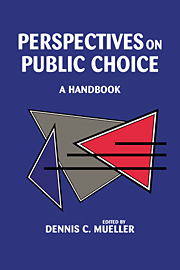Book contents
- Frontmatter
- Contents
- Preface
- Contributors
- 1 Public choice in perspective
- Part I The need for and forms of cooperation
- 2 Economic theories of the state
- 3 Neither markets nor states: Linking transformation processes in collective action arenas
- 4 The political economy of federalism
- 5 The public choice of international organizations
- 6 Constitutional public choice
- Part II Voting rules and preference aggregation
- Part III Electoral politics
- Part IV Individual behavior and collective action
- Part V Public choice in action
- References
- Name index
- Subject index
2 - Economic theories of the state
Published online by Cambridge University Press: 04 May 2010
- Frontmatter
- Contents
- Preface
- Contributors
- 1 Public choice in perspective
- Part I The need for and forms of cooperation
- 2 Economic theories of the state
- 3 Neither markets nor states: Linking transformation processes in collective action arenas
- 4 The political economy of federalism
- 5 The public choice of international organizations
- 6 Constitutional public choice
- Part II Voting rules and preference aggregation
- Part III Electoral politics
- Part IV Individual behavior and collective action
- Part V Public choice in action
- References
- Name index
- Subject index
Summary
In rough outline, political economists have contributed to three categories of explanatory theories of the state based on arguments from, respectively, public goods, coordination, and evolutionary stability. The best known of these and the most extensively articulated are theories that build on public goods, in part perhaps because the theory of public goods has long been relatively well understood in a crude form, and in part perhaps because the public goods theory seems to yield not only an explanation for but also a justification of the state. In any case, the long tradition that grounds the state in the demand for public goods and in the state's capacity to deliver such goods has been both normative and explanatory. The other two traditions are primarily explanatory and not normative.
In its most literal variants, the public goods tradition supposes that people deliberately create the state in order to provide themselves with goods they could not individually provide for themselves, as, for example, by literally contracting to establish government. This bootstrapping move is circular if it is supposed that the state is itself a public good. In frustration at failing to provide ourselves some public good, we merely provide ourselves another that then provides us the one we failed to provide. Although it has not fully withered away and may occasionally betray signs of spontaneous regeneration, this branch of the tradition was finally cut off by Mancur Olson's argument of the logic of collective action (Olson 1965).
- Type
- Chapter
- Information
- Perspectives on Public ChoiceA Handbook, pp. 21 - 34Publisher: Cambridge University PressPrint publication year: 1996
- 5
- Cited by



